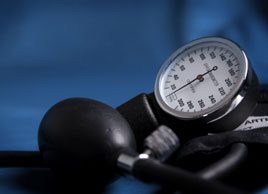Why hypertension is a silent killer
You may know it as hypertension or high blood pressure. But another name for this dangerous condition might as well be ‘silent killer.’ Here’s why

Source: Photo credit: © iStockphoto
It’s silent because you may not realize it’s stalking you. ‘Most often it does not have symptoms,’ says Dr. Richard Ward, a family physician with Calgary Foothills Primary Care Network. If you aren’t checking your blood pressure regularly, there’s no sure way to know if it’s within a healthy range. As for ‘killer,’ that may sound melodramatic. But the damage this condition does to your body is no act.
The murder plot
When you have hypertension, it means that as your blood is being pumped by your heart, it’s putting too much force against the walls of your arteries ‘ enough force to lead to health problems. If your arteries are narrow or stiffen with age, or if your body carries a lot of water or salt, your blood pressure becomes higher.
‘You can think of it as putting excessive pressures on the pipes,’ Dr. Ward says. ‘The risk of those pipes bursting is the biggest effect.’
Different parts of your body will suffer in different ways. Your heart has to work harder when your blood pressure is high. ‘The pump itself is under increasing amounts of stresses by pushing,’ says Dr. Ward. That extra effort can lead to thickening of the heart muscle, making it more difficult for this organ to do its job. Heart failure can follow. If high blood pressure causes your arteries to harden, the risk of heart attack rises.
Your brain is also in peril when your blood pressure goes up. Hypertension is the top trigger for stroke, in which a blood vessel in the brain bursts and bleeds, or a blood clot blocks the flow of blood to the brain. Stroke can cause death, or it can cause brain damage and lifelong disability.
High blood pressure can also give you brain fog ‘ trouble learning, remembering and understanding. And increasing evidence is showing a link between blood vessel disease and dementia or Alzheimer’s disease. ‘If there’s inefficiency in the blood getting to the brain, it only makes sense that brain health would be compromised,’ Dr. Ward notes.
Your kidneys, too, can deteriorate when your blood pressure rises. The blood vessels in these organs may become weak or narrow, and your kidneys become less effective at their job of filtering out wastes and fluids from your body. Since too much water in your body will in turn raise your blood pressure, it’s kind of a lose-lose situation. And it explains why hypertension is one of the most common reasons for kidney failure.
The collateral damage
Even your eyes aren’t immune to the effects of high blood pressure. There are tiny blood vessels here too, and when they’re damaged or blocked, the result is blurred, distorted or lost vision.
Scared straight yet? Both men and women with high blood pressure can experience sexual dysfunction because of compromised blood flow to your precious parts. You’re also at greater risk of bone loss and sleep apnea. These problems may not out-and-out kill you, but they cover a lot of day-to-day functions that you likely don’t want to be without.
Your detective work
To get the best blood pressure reading, you shouldn’t be under the weather, fresh from a cigarette break or burning to go to the bathroom. Otherwise, the measurement will be affected. ‘Blood pressures naturally do fluctuate,’ says Dr. Ward. ‘Feeling unwell or having a really stressful day is the wrong time to take your blood pressure, and may not reflect the accuracy of the reading.’
Relax, keep both feet on the ground, make sure your arm is fully supported, and try not to talk for a few minutes before you check your blood pressure. If your reading is 120/80 or below, you have nothing to worry about. But if it’s 140/90 or higher, or 130/80 if you have diabetes, it’s important that you talk to your doctor about treatment options. You should be measuring your blood pressure at least every three to six months if you’re in a known high-risk group (or once a year if you’re low risk).
Hypertension may be a silent killer. But if you never let it sneak up on you, you’re much less likely to become another one of its victims.
Don’t miss out! Sign up for our free weekly newsletters and get nutritious recipes, healthy weight-loss tips, easy ways to stay in shape and all the health news you need, delivered straight to your inbox.




